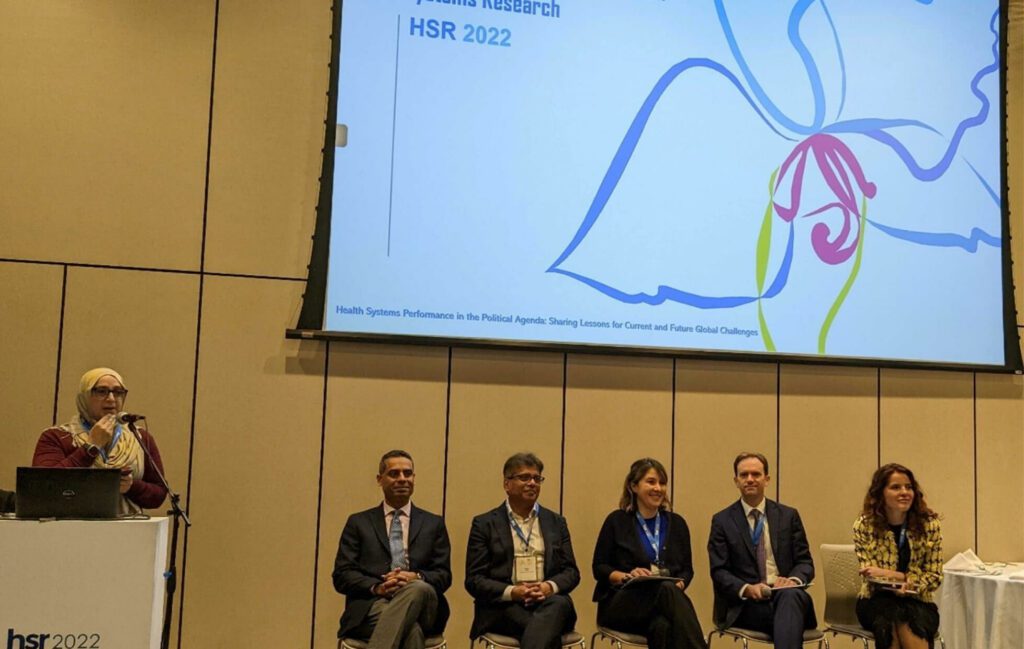
Rehabilitation and assistive technologies are increasingly part of health systems’ agendas. But policies alone are inadequate without shared vision and practical action. Learning, Acting, and Building for Rehabilitation in Health Systems (ReLAB-HS), in collaboration with the World Health Organization (WHO) and Results for Development, presented their shared vision for strengthening rehabilitation in health systems on November 2, 2022, in a satellite session at the 7th Global Symposium on Health Systems Research (HSR2022) in Bogotá, Colombia.
The theme for HSR2022 was Health Systems Performance in the Political Agenda: Sharing Lessons for Current and Future Global Challenges. One of the aims of the conference was to focus on structural issues for health systems.
Drawing from this theme, ReLAB-HS, with the WHO and Results for Development, organized a hybrid satellite session entitled, “Rehabilitation in Health Systems – Responding to Changing Population Needs,” over an early morning Colombian breakfast with about 50 participants. Dr. Nukhba Zia, ReLAB-HS Co-Program Technical Coordinator, moderated the session, which was organized around testimonials of rehabilitation users and advocates from Uganda and Pakistan, and keynote speeches by rehabilitation and health systems experts on the main issues facing the sector, followed by a panel discussion in which panelists fielded questions from session participants.
Professor Barbara McPake, Director of the Nossal Institute for Global Health, opened the session and stressed that integrating rehabilitation into health systems is a necessary response to the epidemiological trends that we are seeing globally: aging populations; changes to the burden of disease; and increasing conflicts resulting in injuries that people are likely to survive, but with enduring impairments.
The keynote speakers contributed a wealth of experience and information that took the audience on a journey of understanding the background of rehabilitation programming in global health. They addressed why health financing needs to have a specific focus on rehabilitation to enable important reforms and proposed what the next steps are in a world where rehabilitation is not considered an integral part of health systems.
Dr. Alarcos Cieza, WHO Unit Head of Sensory Functions, Disability, and Rehabilitation, provided a strategic overview of the global need for rehabilitation, and the impact on individual lives and overall economies of appropriate, timely, and accessible rehabilitation.
“Rehabilitation is…about optimizing healthy life expectancy…[and] improving other clinical outcomes,” she said. “Rehabilitation is also cost-effective in the long run, and, most importantly, makes a huge difference in people’s lives.”
Cieza also shared the current progress of work towards the Rehabilitation 2030 Agenda in 31 countries where tools for situation assessments and strategic plans have been implemented to good effect.
Tamara Chikhradze, Results for Development Associate Director, drew attention to the complexity of health systems financing and the need to ensure that financing mechanisms for rehabilitation provide the right funding for the right services for the right people.
“Even when there is funding available, if the health financing policies are not set up right, it will create serious access issues for people,” explained Chikhradze as she detailed the impacts of poor policy on rehabilitation users.
She noted that strategically ensuring that rehabilitation is included in the largest health finance budgets, within often fragmented health financing, is still an effective means to ensure that rehabilitation is included in strategic purchasing decisions.
ReLAB-HS Director, Dr. Abdulgafoor M. Bachani, discussed the need for a coherent approach to rehabilitation across organizations but emphasized that this is not a ‘greenfield’ situation for any country—how rehabilitation is integrated into existing complex health systems will look different in every context. Bachani showcased the ReLAB-HS Global Rehabilitation Leadership Institute, which aims to strengthen local leadership and policy making that support contextually appropriate rehabilitation services.
“This is a unique time that we have,” he explained. “There’s global interest, there’s local interest, and we really need to leverage that to drive action…in country. We need to develop local champions for change so that these priorities are really emerging from the country.”
The speakers made it clear that there is significant global alignment on issues affecting rehabilitation, and their different perspectives converged on the same point: health systems, and rehabilitation within them, are complex adaptive systems. It is necessary to strengthen health systems as a whole, so that individuals may reap the benefits of improved access to rehabilitation.
ReLAB-HS is made possible by the generous support of the American people through the United States Agency for International Development